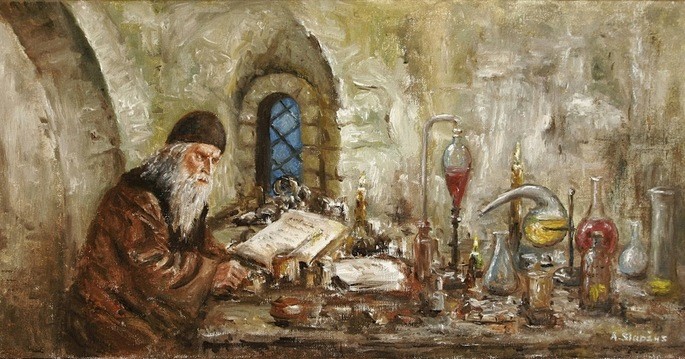The alchemy is a mystical character of practice that flourished during the Middle Ages bringing together science, art and magic.
One of its main objectives was to obtain the elixir of life , in order to guarantee the immortality and cure of diseases of the body. Another important quest was the creation of the philosopher ‘s stone , with the power to transform common metals into gold.
Practiced by several ancient peoples (Arabs, Greeks, Egyptians, Persians, Babylonians, Mesopotamians, Chinese, etc.), alchemy is associated with knowledge of Medicine, Metallurgy, Astrology, Physics and Chemistry. Many of the civilizations that practiced it, created secret alchemical codes and symbols.
The alchemists contributed to the development of several techniques, although they did not explain how the phenomena occurred. To this day, it has an important role, being considered fundamental for the development of sciences, especially Chemistry.

Origin and History of Alchemy
The origin of Alchemy is uncertain, although some scholars believe that it was already practiced in Alexandria, in Ancient Egypt, around the 3rd century BC and remained the main science of the Middle Ages (5th to 15th centuries). However, Chinese Alchemy may be one of the oldest, with traces of this practice in 4500 BC
In the Middle Ages, alchemical studies advanced by observing nature, experiments, chemical procedures, using materials, instruments and devices. These factors were fundamental to the development of modern natural sciences.
The Egyptians developed techniques for manipulating metals and embalming bodies. Later, it was associated with Greco-Roman and Arab knowledge, until it arrived in Europe. Thus, Alchemy was a precursor to Chemistry and Medicine.
In Egypt, the main alchemists were Hermes Trismegisto; in China, Fu Xi stood out; and in Al Ghazali Arabia. Among the most prominent European alchemists are: Alberto Magno, Tritemo, Khunrath, Eliphas Levi.
Contrary to what is reported, alchemy was practiced by several members of the Catholic Church. Even Pope John XXII had studied Alchemy before his priestly ordination and, in 1317, issued a papal decree condemning false alchemists, those who deceived the population by promising easy wealth.
Therefore, in order to protect itself, the language of the alchemists has become increasingly indecipherable. To ensure that the information was well used, symbols and terms were created that would be accessible only to initiates. In this way, the practice of Alchemy becomes more and more secret.
With the establishment of the Court of the Holy Office (better known as the Inquisition ) in certain regions of Germany, Switzerland, France and Spain, Alchemy is now confused with practices considered obscure by the Catholic Church.
Thus, we observed the persecution and condemnation of several sages who were only investigating chemical elements . At that time, the alchemists were excommunicated, arrested and burned at the stake.
Alchemy and the Philosopher’s Stone
Western alchemy has always been obsessed with creating a noble metal from common metals.
The Philosopher’s Stone (called “Great Work” or “Universal Medicine”) was the main objective of the alchemists, mainly in the Middle Ages.

They predicted, from experiments with the four elements of nature (earth, air, water and fire) and various metals, the discovery of a mystical substance capable of transforming any element into gold.
For alchemists, all metals evolved until they reached the state of perfection: gold. In such a way, if we consider the Philosopher’s Stone to be a metaphorical concept, it would be associated with the spiritual quest for cutting the human soul.
Alchemy and the Elixir of Immortality
Chinese alchemy focused its efforts on healing and salvation, developing these two aspects in the quest for immortality.
Based on doctrinal principles, such as Taoism, the idea was to create an elixir of immortality to achieve eternal life and cure all ills.

Main Alchemists
Alchemists are the scientists who used alchemy procedures. They are considered great sages, of which they were highlights in the history:
- Mary, Judia (2nd century BC): Greek alchemist and philosopher
- Nicolas Flamel (1340-1418): French alchemist and clerk
- Caterina Sforza (1463-1509): Italian alchemist
- Paracelsus (1493-1541): German Swiss alchemist, doctor and astrologer
- Marie Meurdrac (1610-1680): French alchemist and chemistry
- Count of St. Germain (1712-1784): Romanian alchemist, goldsmith and musician
- Alessandro Cagliostro (1743-1795): alchemist and Italian Mason
- Fulcanelli (1839-1953): French alchemist
- Eugène Léon Canseliet (1899-1982): French alchemist
Importance of Alchemy
Some researchers believe that Alchemy was not only aimed at transforming chemical substances into others, that is, its objective went far beyond the “proto-science” character.
In this sense, Alchemy was important for the transmutation of values and spiritual growth in harmony with nature.
In China, the alchemists’ investigations led to the mastery of many metallurgy techniques and the discovery of gunpowder. Progress in the east and in the west has been noticeable, both in knowledge and in the use of mineral and vegetable substances.
Thus, we realized that the search for the alchemists was focused on unraveling the mysteries associated with the human soul and its existence in the world. With that, it proved to be an important step for intellectual development and a step for human evolution.
From Alchemy to Chemistry
The need to understand the relationship between human beings, nature and phenomena made Alchemy an important practice in the development of knowledge and techniques that would later be used in modern Chemistry.
For some, in the Arabic language, the term “Alchemy” ( Al-Khemy ) means “chemistry”.

Alchemists, in order to find the philosopher’s stone and the elixir of life, played a key role in the creation of numerous laboratory devices, which were gradually improved.
In this search, processes were developed for the production of metals, soaps, and numerous chemical substances, such as nitric acid, sulfuric acid and potassium hydroxide. The alchemists left their marks with the experiments carried out and the many discoveries paved the way for Chemistry .
However, the ideas that supported Alchemy were abandoned around the 18th century, a time when the beginning of modern Chemistry is considered.
